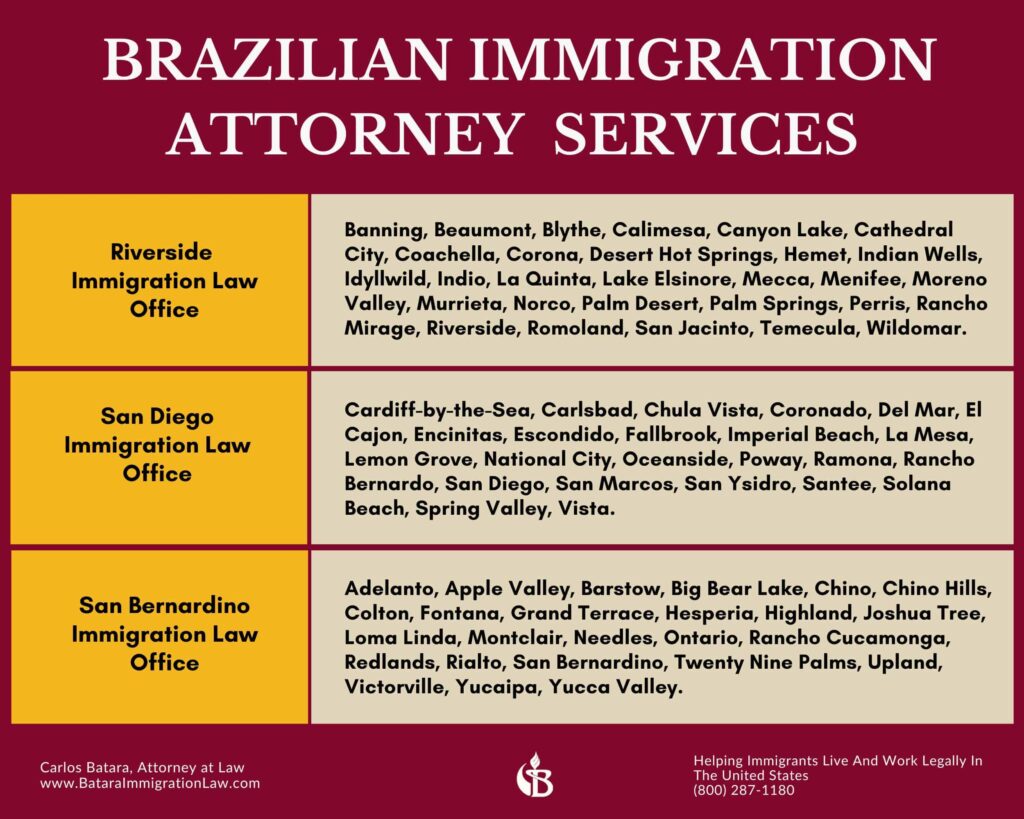How Our Office Helps Immigrants From Brazil Win Hard Cases And Green Cards

Planning Ahead Prevents Deportation Of Brazilian Immigrant Scholar
In this article, having helped as an immigration lawyer for Brazilian immigrants living in the United States win permanent residence, Carlos Batara shares how one client was able to overcome the threat of deportation. It highlights the importance of strategic planning. This process does not start one night and end the next. Rather, it’s a formula for success that requires thinking forward.
Elizabeth, a successful Brazilian restaurant owner, wanted to help her brothers, Robert and Victor, become permanent residents.
Her brothers were high school scholars and nearing graduation.
Robert was a senior in high school. He was an “A” student. He would graduate in one month. Victor was a junior in high school. He was also an “A” student and he would graduate during the next school year.
Born in Sao Paulo, they had legally entered the United States as Brazilian immigrants at a young age. They arrived with their mother who only planned to visit various relatives.
They never left. Now they were overstays, without legal permission to live here. Each day that passed, they were accruing unlawful presence. They were increasingly vulnerable to being apprehended and deported.
They did not talk with a Brazilian Immigration Attorney before deciding to remain in the U.S.
Driving to work one day several months before, Elizabeth heard about a new immigration program and wanted her brothers to apply. She went to the local immigration office to find out more details. An officer told her to fill out some papers for them. He told her that they would be mailed a notice when to appear for their interviews.
Just before the law was going to change, her brothers were sent an interview notice. They were summoned to appear at an Immigration and Customs Enforcement office.
A few days before their appointment, a friend encouraged Elizabeth to speak with a lawyer before going to the interview.
Her friend recommended she contact Carlos, based on his track record serving as an attorney for Brazilian immigrants living in Southern California.
The next day Elizabeth set up an appointment at our San Diego immigration law office. She brought her brothers. She started off by asking about the new immigration rules.
At the family’s strategy and planning session, she learned about the potential for adverse consequences if they attended the appointment. She found out that she would be placing her brothers in a situation which could make their chances to win permanent residence status more, not less, difficult.
In the eyes of the law, Carlos stressed, they were undocumented immigrants from Brazil subject to removal.
And, he noted, the interview would begin the deportation process, a process that would not end until a final decision was rendered.
A Tale Of Triumph: Brazilian
Immigration Success Story
As a green card lawyer for immigrants born in Brazil, Carlos knew that overstaying was not an uncommon phenomenon among citizens from Elizabeth and her family’s home country.
Government officers, he said, often refer to a yo-yo migration pattern among immigrants from Brazil who live in the United States without permission.
Brazilian Immigrants In The United States
Brazilian migration to the U.S. was the subject of a recent study by the Migration Policy Institute.
According to MPI, the amount of Brazilian immigrants arriving in the U.S. were relatively small until the early 1980s, caused by a series of economic crises in Brazil.
By the end of the 1980s, the Brazilian immigrant population had doubled. It nearly tripled in the 1990s. It tapered off during the recession years of 2007 – 2009.
As of 2017, 451,000 immigrants born in Brazil lived in the United States, representing 1% of the 44.5 million immigrants in the country.
Carlos explained the papers which the agent wanted her brothers to sign were “surrender” forms. At the meeting, they would acknowledge they were living in the U.S. without proper authorization. Then they would be scheduled to see a judge at immigration court to begin deportation hearings against them.
It would not matter that they were exemplary students and role models.
At first, Elizabeth argued with Carlos. She refused to accept his viewpoint that going to the appointment might destroy the immigration aspirations of her brothers forever.
How could government authorities, she wondered, act in such a calloused manner?
She asserted, over and over again, since she had talked with immigration officers long before, they were obligated to evaluate her brothers’ matters under the law which existed before the new changes took effect.
Carlos would not budge. He insisted there was no guarantee how the cases would be handled. If immigration officials used the new law, her brothers would suffer.
Plain and simple, he asserted that ICE cannot be trusted even with a simple-looking questionnaire or survey.
At the end of the meeting, she reluctantly went along with his suggestions.
But she was not happy the wait for them to immigrate would take so long.

Strategic Preparation In Advance Preserves Brazilian Green Card Victory
Elizabeth agreed to an alternative plan. After more thought, she would file an immigration visa petition for her brothers, one apiece.
She had confided with her friend who had referred Carlos. Her friend told her, given his experience as a Brazilian Immigration Attorney, he was trustworthy. His advice, though not she wanted to hear, was worth seriously taking into consideration.
She was aware of the long wait for Brazilian immigrant brothers and sisters who seek a sibling green card through the visa preference categories. She did not like the idea of filing visa petitions if they were not likely to lead to their permanent residence for several years.
Based on experience as a Brazilian immigration lawyer in Riverside, San Bernardino, and Hemet, as well as San Diego, Carlos emphasized the tactical importance of her filing might make a significant difference in the future for them.
Because Elizabeth had already filed an immigrant relative petition for her mother, Carlos highlighted the potential strategic advantage.
Once her mother received green card status, she would be able to file new immigration petitions for Robert and Victor as their parent.
Even though the wait would be long – maybe 5 to 6 years – it would be shorter than if they simply waited for Elizabeth’s petition for her brothers to be processed by the government.
By filing now, the approval date of her siblings’ petitions would enable her brothers to use this date as a “protective filing date” under INA 245(i) when their mother submitted new paperwork for them.

BATARA IMMIGRATION LAW INSIGHTS
Grandfathering: How To Win Adjustment Of Status Under INA 245(i)
Elizabeth was not fully persuaded but went along with the plan.
Meanwhile, the brothers went to junior college because they could not get into regular state colleges without valid immigration documents.
When Robert finished his sophomore year, he quit school to find regular employment.
The next year, Victor, decided to attend a four year university as a foreign student and pay the high foreign student tuition fees.
Rising Above: How Brazilian Immigration Attorney Plan Conquered Deportation
He graduated with high honors and was accepted to a college on the East Coast for a Master’s Degree program. Again, he enrolled as a foreign student.
In his second year, Victor was involved in an altercation when some roughnecks started to harass his girl friend. He was charged with various crimes. He was too embarrassed to tell his sister. He did not have money to hire a lawyer, so he decided not to fight his case. He pled guilty to a misdemeanor. He was put on probation for a year.
A few months later, while he was in his probation officer’s office, she called the police to arrest him again and turn him over deportation officers. Scared, he finally contacted his sister.
Elizabeth, in turn, called Carlos.
He flew out immediately to Massachusetts to represent Victor at immigration court and to reduce the amount of bail set by ICE.
He assessed the various defenses against deportation and removal available. Victor’s Cancellation of Removal defense seemed weak based on his long-distance relationship with his mother.
However, Carlos learned Victor was engaged to his girlfriend, Prazeres, and they had a tentative marriage date already scheduled. Carlos decided to pursue a defense strategy which highlighted their pending marriage.
Prazeres understood Victor’s situation. Her parents were immigrants from Portugal. They were deeply involved in Portuguese-American community affairs, including immigration issues.
Victor and Prazeres had to speed up their marriage date. This still did not take Victor out of the danger zone.
But his sister’s protective filing for him, submitted reluctantly, saved the day. Combining that earlier filing with Victor’s marriage to a U.S. citizen, Carlos was able to get Victor’s deportation case dismissed by the Boston Immigration Court.
Ultimately. Elizabeth’s immigration near-fatal error was transformed into her brother’s Brazilian Immigration Success Story.
Victor remained on the East Coast after graduation from college, again graduating with honors. Over time, his status changed from Brazilian immigrant to U.S. citizen.
And today, he and Prazeres live in New Hampshire, and have three children.
No matter how difficult the road ahead may seem, do not give up without exploring all your options. This series of immigrant success stories is dedicated to those who refuse to stop believing that some day, somehow, victory will be theirs.
This article, focused on the topics of deportation defense and permanent residence, is Example Number 5 on the different types of challenges and obstacles which immigration lawyer Carlos Batara has helped immigrants overcome.
Previous: From Refugee To Professor
We Help Brazilian Immigrants Coast
To Coast Across The Country
For over 25 years, Carlos Batara has helped immigrants from 47 different states win hard cases and become permanent residents.
We provide a full range of immigration services throughout the United States via our online and virtual immigration office.
We also offer direct, in-person help for Brazilian clients living in the Southern California region.

Riverside Brazilian Immigration
Lawyer Services
Our Riverside and Hemet law offices assist immigrants who live in or nearby Banning, Beaumont, Blythe, Calimesa, Canyon Lake, Cathedral City, Coachella, Corona, Desert Hot Springs, Hemet, Indian Wells, Idyllwild, Indio, La Quinta, Lake Elsinore, Mecca, Menifee, Moreno Valley, Murrieta, Norco, Palm Desert, Palm Springs, Perris, Riverside, Rancho Mirage, Romoland, San Jacinto, Temecula, and Wildomar.
San Diego Brazilian Immigration
Lawyer Services
Our San Diego and Escondido offices help immigrants from Cardiff-by-the-Sea, Carlsbad, Chula Vista, Coronado, Del Mar, El Cajon, Encinitas, Escondido, Fallbrook, Imperial Beach, La Mesa, Lemon Grove, National City, Oceanside, Poway, Ramona, Rancho Bernardo, San Diego, San Marcos, San Ysidro, Santee, Solana Beach, Spring Valley, and Vista.
San Bernardino Brazilian Immigration Lawyer Services
At the San Bernardino office, we guide immigrants living in or close to Adelanto, Apple Valley, Barstow, Big Bear Lake, Chino, Chino Hills, Colton, Fontana, Grand Terrace, Hesperia, Highland, Joshua Tree, Loma Linda, Montclair, Needles, Ontario, Rancho Cucamonga, Redlands, Rialto, San Bernardino, Twenty Nine Palms, Upland, Victorville, Yucaipa, and Yucca Valley.





